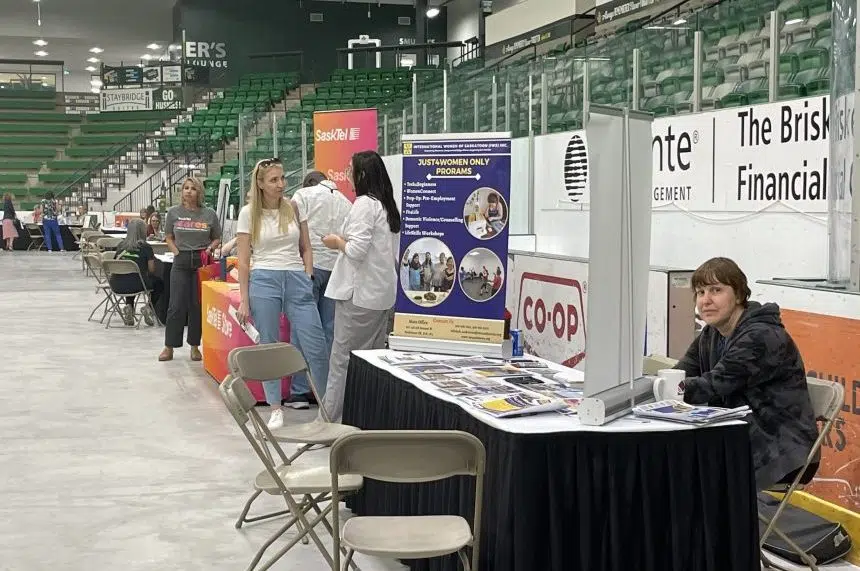Rows of booths were set up to make Ukrainian newcomers feel welcome at Merlis Belsher Place on Thursday.
It was part of a “one-stop shop” for those who have fled the war in Ukraine.
People from places like the Saskatoon Public Library, the Saskatoon Fire Department and the Open Door Society were there to help answer questions about getting settled and life in the city.
Newcomers who stopped by could pick up a free SIM card, set up their social insurance number and inquire about child-care options.
And a full row showcased employers ready to accept resumes and applications from potential Ukrainian hires in engineering and agriculture positions.
Chantelle Earnshaw and Olena Khlbina were representing TOPA Contracting, recruiting people to work in janitorial, security, labour and electrical roles with their company.
Based primarily in Esterhazy and Rocanville, Khlbina — who herself is from Ukraine and was acting as a translator on Thursday — said many people were mostly interested in living in the city.
“We’re hoping to get more people rural,” Earnshaw explained.
“Lots of people want (the) big city but we try (to) explain it’s good in town (and) small towns. (It’s) nice and safe,” Khlbina said.
“We have everything inside (the town). Don’t worry,” is the message Khlbina has been sharing with newcomers.
Khlbina also heard some people share how they came to Saskatoon. One woman had a scary story about escaping Mariupol.
“She said she came just two hours before (Russian) soldiers come into the city,” Khlbina shared.
“She got lucky, moving at exactly (the) perfect time because later it’s going to be very hard.”
Earnshaw said education isn’t the most important part of their hiring, though some spoken and written English would be an asset to people looking to work for TOPA.
“At this point, we’re definitely willing to help people learn,” Earnshaw said.
Abdullah Olewi with the Saskatchewan Intercultural Association spent the day answering questions about the services it offers to newcomers.
“I’ve gotten a few requests that I’ll have to address when I get back to the office,” Olewi said.
The major theme of the day, he said, was questions about language classes.
Olewi also answered inquiries about work, child care and travel licences and even one from an individual concerned about their immigration process.
He said the role of the intercultural association is to help people transition here through helping them access as many services as they need.
“Many people go for a long time without knowing what they are eligible for, what they can get access to or what they can benefit from,” Olewi explained.
If the services aren’t those that the association offers, Olewi said it’ll help someone find the support they need somewhere else.







